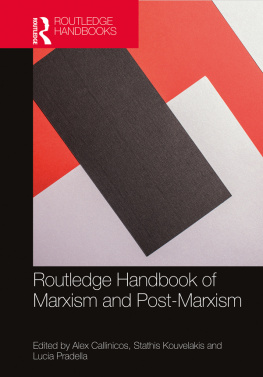Kamenka - The Ethical Foundations of Marxism (RLE Marxism)
Here you can read online Kamenka - The Ethical Foundations of Marxism (RLE Marxism) full text of the book (entire story) in english for free. Download pdf and epub, get meaning, cover and reviews about this ebook. publisher: Taylor & Francis (CAM), genre: Science. Description of the work, (preface) as well as reviews are available. Best literature library LitArk.com created for fans of good reading and offers a wide selection of genres:
Romance novel
Science fiction
Adventure
Detective
Science
History
Home and family
Prose
Art
Politics
Computer
Non-fiction
Religion
Business
Children
Humor
Choose a favorite category and find really read worthwhile books. Enjoy immersion in the world of imagination, feel the emotions of the characters or learn something new for yourself, make an fascinating discovery.
The Ethical Foundations of Marxism (RLE Marxism): summary, description and annotation
We offer to read an annotation, description, summary or preface (depends on what the author of the book "The Ethical Foundations of Marxism (RLE Marxism)" wrote himself). If you haven't found the necessary information about the book — write in the comments, we will try to find it.
Kamenka: author's other books
Who wrote The Ethical Foundations of Marxism (RLE Marxism)? Find out the surname, the name of the author of the book and a list of all author's works by series.
The Ethical Foundations of Marxism (RLE Marxism) — read online for free the complete book (whole text) full work
Below is the text of the book, divided by pages. System saving the place of the last page read, allows you to conveniently read the book "The Ethical Foundations of Marxism (RLE Marxism)" online for free, without having to search again every time where you left off. Put a bookmark, and you can go to the page where you finished reading at any time.
Font size:
Interval:
Bookmark:

ROUTLEDGE LIBRARY EDITIONS: MARXISM
Volume 3
THE ETHICAL FOUNDATIONS OF MARXISM
THE ETHICAL FOUNDATIONS OF MARXISM
EUGENE KAMENKA

First published in 1962
This edition first published in 2015
by Routledge
2 Park Square, Milton Park, Abingdon, Oxon OX14 4RN
and by Routledge
711 Third Avenue, New York, NY 10017
Routledge is an imprint of the Taylor & Francis Group, an informa business
1962, 1972 Eugene Kamenka
All rights reserved. No part of this book may be reprinted or reproduced or utilised in any form or by any electronic, mechanical, or other means, now known or hereafter invented, including photocopying and recording, or in any information storage or retrieval system, without permission in writing from the publishers.
Trademark notice: Product or corporate names may be trademarks or registered trademarks, and are used only for identification and explanation without intent to infringe.
British Library Cataloguing in Publication Data
A catalogue record for this book is available from the British Library
ISBN: 978-1-138-85502-1 (Set)
ISBN: 978-1-315-71284-0 (Set) (ebk)
ISBN: 978-1-138-88550-9 (Volume 3) (hbk)
ISBN: 978-1-315-71539-1 (Volume 3) (ebk)
Publishers Note
The publisher has gone to great lengths to ensure the quality of this reprint but points out that some imperfections in the original copies may be apparent.
Disclaimer
The publisher has made every effort to trace copyright holders and would welcome correspondence from those they have been unable to trace.
THE ETHICAL FOUNDATIONS OF MARXISM
by
EUGENE KAMENKA

First published 1962
Second edition 1972
by Routledge & Kegan Paul Ltd
Broadway House, 68-74 Carter Lane,
London EC4V 5EL and
9 Park Street,
Boston, Mass, 02108, U.S.A.
Printed in Great Britain by
Redwood Press Limited
Trowbridge, Wiltshire
Eugene Kamenka, 1962, 1972
No part of this book may be reproduced in any form without permission from the publisher, except for the quotation of brief passages in criticism
ISBN 0 7100 7360 7
Contents
IT is now almost ten years since this book was first published. I still hold, without significant reservations, what I take to be the books main theses in the area of Marx scholarship. These are:
(1) The underlying ethical and logical assumptions of Marxs work are to be understood in terms of a technical metaphysical concept of freedom, involving the associated philosophical notions of universality, rationality and self-determination.
(2) The internal logic of Marxs intellectual development is to be understood as the attempt to realise his concept of freedom by overcoming the dualisms of universal and particular, society and individual, civil society and state, autonomy and heteronomy.
(3) Marxs work thus reveals no radical break between his early philosophical concern with freedom and alienation and his subsequent exposition of an allegedly scientific theory of social change and social development. After his discovery of the materialist interpretation of history in the spring of 1845 we find a certain change in style and a growing socio-historical concreteness. Marxs concern shifts from proclaiming the philosophical nature of freedom to ever-deepening studies of the social and historical conditions that produce alienation, but we do not find a change of theoretical structure or a major revision of his philosophical premises.
These three theses, which go to make up and explain the assertion that alienation is a central concept in Marxs work, are now very much more familiar to an educated English-speaking public than they were ten years ago. As set out in this book, they may not command universal assent; nevertheless it seems to me that they have survived unscathed the widespread scholarly discussion of these issues, a discussion that takes up material in this book and in other books. Certainly, these theses have gained much wider acceptance than they had ten or fifteen years ago and among the scholarly the place of ethics in Marxs intellectual development and in his mature scientific system is now very much better understood. For a period, under the influence of such men as Robert Tucker, Fromm and Marcuse, this led, intra et extra muros, to an excessive moralisation of Marx, to a tendency to expose him as a moralistic religious ideologist or to deify him as a philosopher of the human condition whose relevance is eternal and largely independent of the concrete social and historical details of his work. In my more recent writings on Marx and Marxism, no doubt in reaction against this tendency and the growing misuse of Marxs name by peasant anarchists, romantic nihilists and revolutionary Jacobins, I have put greater stress on the nineteenth-century European context and on the specific socio-historical content of Marxs work, on his numerous social insights, on his concern with modernisation, with revolutionary realism, with the educative role of the industrial process, and with the social base of a revolution. Nevertheless, the eliciting of Marxs philosophical and ethical assumptions does remain of central importance to an understanding of the total thrust and direction of his work, to a grasp of the interrelation of its parts, to a deeper appreciation of the force and point of his key categories, from exploitation and dehumanisation to free labour and the proletariat as a universal class.
With all this in mind, I have thought it best to allow this book to go into a second edition unchanged, except for the correction of misprints and some minor improvements in the Index. To write in the historical dimension of Marxs work at this stage would be to open up new concerns more appropriate to another book and to destroy the unity and coherence that I have striven to give this one. Similar considerations have made me resist the temptation provided by a new edition to expound in somewhat greater detail my views on the extent of Marxs debt to Kant, to Fichte, to Hegel, to Feuerbach, to Moses Hess, to French Socialism and French historiography, to Ferguson and to classical English economics. The determination of Marxs precise position in the movement of ideas is both exciting and difficult; Marxs work is part of many intellectual histories. The careful reader of this book will note a certain emphasis on the Young Hegelian character of Marxs interpretation of Hegel and on his consequent debt to Kant and Fichte and to the aesthetics of German Romanticism. This is part of what is now often discussed under the heading Marxs Prometheanism and Marxs handling of alienation in many respects owes more to Fichte than it does to Hegel. I have said and am saying something more on these matters in other works. Here, I was concerned to refer to Marxs intellectual antecedents and to his cultural debts only in so far as such reference was necessary to an understanding of Marxs work; it seems best to leave it thus.
EUGENE KAMENKA
Canberra,
1971
MARXISM, as a theoretical system, is a product of nineteenth-century north-western Europe, which nevertheless looks beyond Europe and its nineteenth century. In the name of science and of man it seeks to transcend the specific divisions of climate, race and creed, of nation-state and language-group, in order to chart a common future for mankind.
Next pageFont size:
Interval:
Bookmark:
Similar books «The Ethical Foundations of Marxism (RLE Marxism)»
Look at similar books to The Ethical Foundations of Marxism (RLE Marxism). We have selected literature similar in name and meaning in the hope of providing readers with more options to find new, interesting, not yet read works.
Discussion, reviews of the book The Ethical Foundations of Marxism (RLE Marxism) and just readers' own opinions. Leave your comments, write what you think about the work, its meaning or the main characters. Specify what exactly you liked and what you didn't like, and why you think so.











